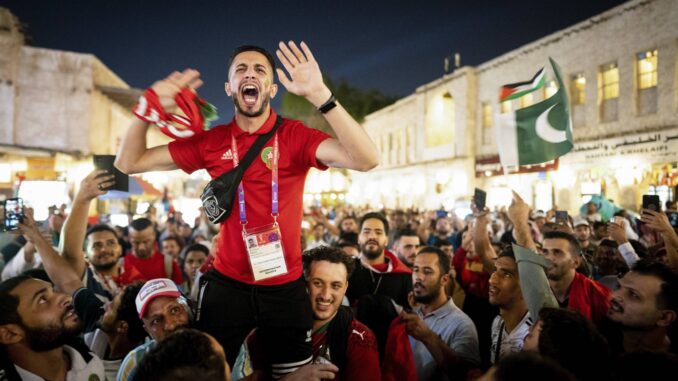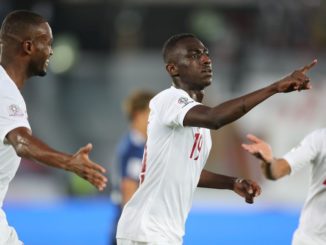

The Asian Game’s coverage of the FIFA World Cup Qatar 2022 is proudly sponsored by SMC.
Normal is one of those words in the English language that means different things to different people.
A person’s ‘normal’ is defined by their culture, their experience, their language and so many more variables. ‘Normal’ is so subjective that you wonder if such a thing as ‘normal’ even exists, at least on a global scale. In a world as diverse as ours can there ever truly be something ‘normal’?
Which is why it’s been curious to read and hear so many complaints about this World Cup in Qatar and the experience of those who have traveled to Doha for it, be they fans or particularly media.
Time and again we’ve heard that this doesn’t feel like a ‘normal’ World Cup, which poses the question – what is a normal World Cup? And should there be such a thing as a normal World Cup?
Since it’s first tournament in 1930, the World Cup has been hosted or co-hosted in 18 different countries from Uruguay to Italy to Japan to the USA.
The nations that have hosted the tournament are as diverse as those who play the game, but the love of football has always been the common thread.
Despite what has been said or written, that is as true of the Arab world as anywhere else. One simply had to be at the Lusail Stadium to witness Argentina take on Saudi Arabia.
Those who were lucky enough to be there will never forget it. There was no shortage of football passion from the Saudis on that day, or in any of their subsequent matches.
Fans from North Africa have attended in droves, this being the closest thing they’ve had to a home World Cup. My ears are still ringing from the Moroccan fans at Education City Stadium earlier this week when they defeated the Spanish.
This World Cup in Qatar, however, has come in for particular criticism. It has to be noted that the majority of those complaining loudest are from the western world, perhaps experiencing their first taste of football and culture from the Arab world.
In the days leading up to the tournament, and even during the tournament, multiple voices told us that it didn’t feel like a ‘normal’ World Cup, or even a ‘real’ World Cup.
But should a tournament held in the Arab world for the first time in almost a century feel the same as a tournament hosted in, say, Germany? Or Japan? Or Brazil?
What makes the World Cup a truly spectacular event is its very nature – it is a World Cup, with teams and fans coming from all corners of the globe.
It is also hosted in all corners of the globe.
Because of that, the World Cup will be different every where it goes. Or at least it should be, that is the entire point. The World Cup is a window to the world. Journeying to a World Cup is as much about experiencing new cultures and meeting new people as it is about watching the football.
Where else will you see Mexican and Saudi Arabian fans mingling together, with those from Saudi wearing the Sombrero and those from Mexico decked out in the kaffiyeh?
Moroccans, Algerians, Japanese, Australians, Brazilians, even Iranians and Americans, all the same; all mingling and mixing together showing what humanity at its finest looks like.
As any seasoned traveller will tell you, no two places are the same, even within the same continent. When you travel to Tokyo, you want to experience something that is authentically Japanese. You don’t go to Japan to experience a French culture, just as you don’t travel to Italy to experience a Brazilian culture.
So it stands to reason that no two World Cups would be the same. The experience should be different because it is being hosted in a different part of the world. The experience in Qatar should be different to that of Russia and should be different to that of Brazil.
There should never be a ‘Disney-fication’ of the World Cup where the experience is exactly the same wherever it is held. To have as such would be a great shame and take away what makes the World Cup such a beautiful tournament.
Without having been to previous World Cups to use as a reference point, what has struck me about this World Cup as I have traveled around Doha is its distinctly Arab flavour; and that shouldn’t come as any surprise given it is being held in the Arab world.
Everywhere you go, especially through the alleyways of Souq Waqif, the meeting point for the world over the past month, there has been a plethora of flags and fans from this part of the world – Moroccan, Algerian, Tunisian, Saudi, Qatari, Bahraini and a lot of Palestinean flags.
It is these fans that have been providing the noise and colour to this World Cup and they’ve been doing it in a distinctly Arab way. There’s no beer-fueled, boisterous antics and sing-alongs that, while great in their own context, are not in keeping with football culture in this part of the world.
The lack of freely available alcohol – but make no mistake, there is plenty of alcohol available – has given this World Cup a congenial feel. Far from the scenes we saw at the Euros final at Wembley or the UEFA Champions League final in Paris, the latter albeit the fault of the authorities rather than the fans, this World Cup has had a very convivial and relaxed atmosphere.
A different atmosphere shouldn’t be confused for a lack of atmosphere.
While Doha has emptied out as a lot of nations have been eliminated, the experience and memories of the opening two weeks still linger.




